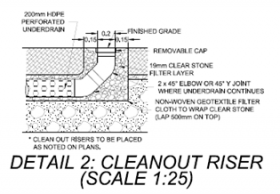Construction: tendering and contract
Tendering and contract[edit]
Ensure there is alignment between contract and tendered drawings, including their details, notes, ESC requirements, material specifications, and testing requirements. Given that most standard contract templates do not include this wording, considerations for LID can be placed under special provisions within the contract. A clear tender attracts experienced contractors to the project. A detailed bid form that accurately reflects the entirety of the work allows contractors to deliver accurate bids. Clear bid pricing reduces the potential for misunderstandings and conflicts down the road. What might seem to them like a reasonable, cost-saving measure to a contractor—e.g., installing a t-junction in place of a y-junction or using a standard excavator in place of a mini-excavator—can lead to sub-optimal performance or even failure. A clear tender with the necessary construction notes should avoid these sorts of problems.
| A simple departure from the design—installing a T-junction in place of a Y-junction—would have made it extremely difficult or impossible to inspect this underdrain and flush it out. |
Minimum contractor requirements[edit]
Many contractors are unfamiliar with building LID practices. Whether an open or invited bid, minimum contractor requirements can be established in order to provide a project bid. Contractor training, attendance of pre-bid meetings, LID project references and bid bond insurance can form minimum contractor requirements.

